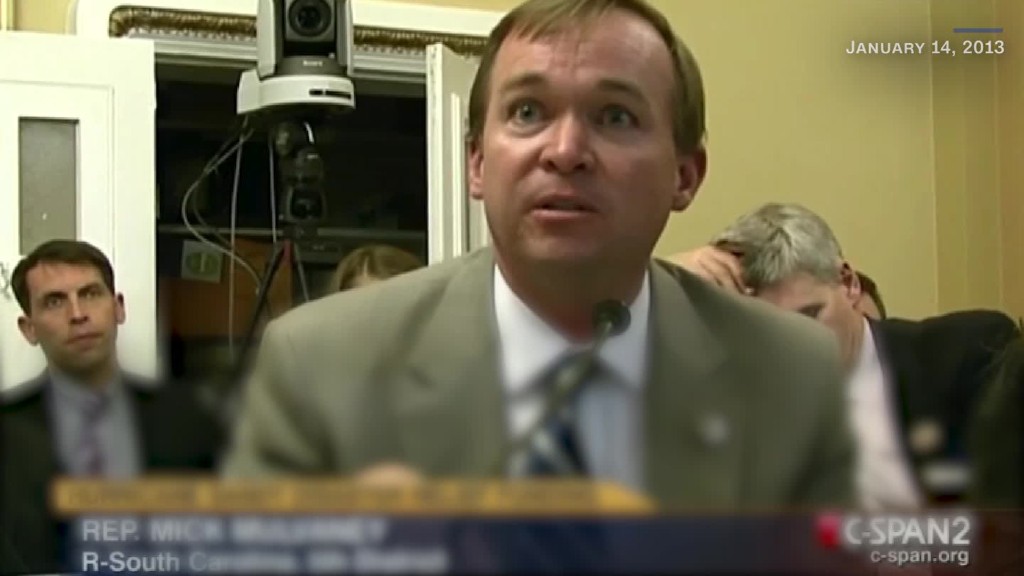
The nonpartisan Congressional Budget Office on Monday released its 10-year budget and economic outlook, and the news isn't good.
The report shows a notable deterioration in the country's debt outlook, thanks largely to the trillions in tax cuts passed by Republicans and a pricey two-year budget deal and spending bill recently passed by both parties.
The CBO now projects trillion-dollar deficits will start in 2020, two years ahead of what it projected just 10 months ago, although it will come close ($981 billion) by next year. By 2028, the agency expects the deficit to top $1.5 trillion.
"The legislation has significantly reduced revenues and increased outlays anticipated under current law," the CBO report notes.
Related: Interest payments on US debt could top $1 trillion
Trillion-dollar deficits, of course, were a hallmark of the financial crisis a decade ago — and its aftermath, the Great Recession. Economic activity fell off a cliff and interest rates dropped to historic lows.
The big difference, though, is that the US economy today is fairly strong, and interest rates are on the rise, further pushing up borrowing costs.
While dollar amounts are telling, the magnitude of deficits is even better measured as a share of the economy. Starting this year, annual deficits will exceed the 3.5% of GDP recorded last year. They will range from 4% to north of 5% over the next decade. The peak comes in 2022, then moderates to just below 5% after 2025, when the recently passed tax cuts for individuals expire.
Thanks to the anticipated rise in interest rates coupled with growing debt, the CBO now projects that annual interest costs alone will hit $915 billion by 2028. That's "roughly triple what they are this year in nominal terms and roughly double when measured as a percentage of GDP," the CBO said.
Interest costs are also on track to top what the federal government will spend on non-defense discretionary spending, which accounts for spending on everything other than defense and so-called entitlements, such as Medicare and Social Security.
If the tax cuts set to expire after 2025 are continued — something Republican lawmakers have said they want — and if scheduled spending cuts from current levels don't occur, then the deficit and debt picture deteriorates further.
The result? Total debt held by the public — a reflection of cumulative deficits over the years — would reach about 105% of GDP by the end of 2028. That level has only been exceeded once in the country's history — immediately after World War II.
As it is, debt is on track to hit nearly 100% by 2028.
The concern is that these unusually high deficits are projected to continue into subsequent decades, absent changes to spending and revenue.
"Our forecast beyond 2028 shows nothing but rising deficits," CBO director Keith Hall noted in a briefing with reporters. "Nobody knows what's too much debt, what will cause a fiscal crisis."
But the more debt you have, the more likely such a crisis becomes, he added. And the longer you wait to tackle the growth in debt, "the more draconian the measures you must take."
Related: Interest payments on US debt could top $1 trillion
The Trump administration, meanwhile, has contended that the new tax law in combination with the rest of the White House economic agenda will not only generate enough new revenue to pay for the tax cuts, but raise an additional $300 billion over a decade.
The CBO report shows that the tax cuts and spending increases will gin up GDP, especially in the next two years. The tax cuts alone could create 1.1 million jobs on average over the next decade. But the growth effects are not enough to offset the full cost of the tax cuts, by CBO's estimates. The report does not include anything about the effects of the tariffs that President Trump wants to impose on goods from other countries.
The view from the Hill
In response to the CBO report, Republican Senator James Lankford of Oklahoma echoed a common GOP refrain that higher revenue from economic growth is needed to combat debt, but that the focus must be on curbing spending.
"We must slow the growth of entitlement spending, increase revenues with a growing economy, and make responsible spending cuts," Lankford said.
Several Democrats, meanwhile, used the report to rip the GOP's tax overhaul.
"In their craven haste to give corporations and the wealthiest 1 percent massive tax breaks, Republicans saddled our children and grandchildren with trillions of dollars of debt," said House Minority Leader Nancy Pelosi.
Republicans have been scrambling to show voters that they're working to reduce deficits, even though some of the most vocal, self-proclaimed deficit hawks in the party voted for both the tax cuts and the higher spending caps.
The House GOP this week will vote on a balanced budget amendment. And President Trump, despite just signing a $1.3 trillion spending bill passed by Congress, reportedly wants to cancel select portions of the funding. But doing so could require Congressional approval, which might be hard to wrangle.
-- CNN's Deirdre Walsh and Ted Barrett contributed to this report.


